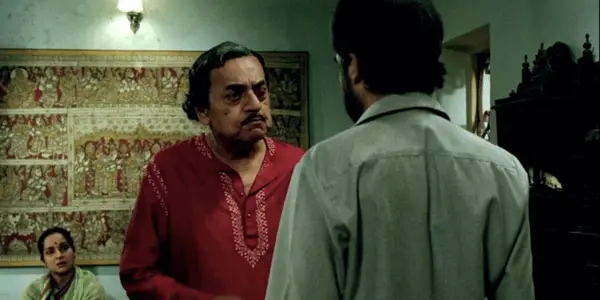Satyajit Ray’s Agantuk (The Stranger) attempts two examinations of India – one of gender dynamics, as contained within the typical marriage, and the other a much more philosophical look at the ways in which the modern capitalist influence on the country has deteriorated relations between the population’s collective history as Indians. When Anila Bose gets a letter addressed to her from her long lost uncle Manmohan Mitra saying he would like to visit, the first examination is manifested in her husband Sudhindra being automatically suspicious of his authenticity. Their household suddenly transforms from a tranquil abode into a place of deep anxiety.
Husbands & Wives & Strangers
I know this couple in real life because they are my parents, but I can confidently say the dynamic of the skeptical practical-minded Indian man paired with the more gentle-hearted but easily influenced wife is not uncommon in Indian marriages, especially of the 60s/70s generation. In the mind of Sudhindra, Anila’s good nature is naïve and a character flaw in a society that he deems to be completely untrustworthy. Her good heart also allows her to be molded by his thoughts and he ultimately convinces her that even if Manmohan is her real uncle, he’s just here to get his share of the family inheritance. Many of the sequences play to a similar dynamic from Ingmar Bergman’s Scenes from a Marriage sans any sexual tension and Anila being not quite as outspoken as Marianne. In the same way Bergman looked at his couple as a microcosm for his parent’s generation’s relationships, the same can be witnessed here for the parents of many Indian millennials.

Manmohan Mitra (played by the legendary Utpal Dutt) is purposefully enigmatic about his identity. Is he a malevolent or benevolent presence? This is a funny question because most of the anxiety and unease that hangs over the film occurs only because of Anila and Sudhindra’s bickering and distrust – Manmohan meanwhile, goes about his days in relative comfort. This doesn’t mean he doesn’t know what’s going on. Sudhindra finds out that Manmohan is, as he calls “a shrewd operator” after telling Sudhindra that his passport identification picture and information is not reliable. Why does he do this? While the dynamics of the Indian man and woman are a statement on what is happening in the closed doors of the nation’s people, there is a greater examination of India’s cultural history being had in Manmohan’s arrival. He is a learned man, well-traveled, extremely knowledgeable, and has a completely radical and rare ideology that does not mesh with traditionalist Indian practicality.
New Ideas and Old Histories
An extensive debate takes place between Manmohan and a lawyer friend who Sudhindra invites, hoping that this will finally get Manmohan to spill his beans. What happens instead is a fiery discussion of exactly what has happened to India post-independence. The technological and economic advancements of the nation catapulted it towards becoming ‘civilized’, but on who’s terms and by who’s definition? Manmohan reveals he is an anthropologist who has spent most of his life struggling with odd jobs but eventually pursuing education and well-paid research in native cultures. He lists the various indigenous cultures of India, their place in the country’s history, their roots in the land, and the technological and economic innovations of their falsely assumed ‘uncivilized’ status.
Manmohan is frustrating in his reluctance to give a straight answer to his identity, but the reason for that is eventually spread out in the open, as not an arrogant act by him, but the result of extremely narrow margins of thinking that has been instituted by Western capitalism. The entire barrier set between Manmohan and the couple of Anila and Sudhindra is toppled by a singular act – near the end of the movie, Manmohan leaves unannounced and spends his time in a village of the Kol, an Austro-Asiatic people who are India’s oldest known inhabitants. When the couple go to catch up with him there, they watch a dance performance. Tears begin to roll down Anila’s face and she joins the group of women. Something in her recognizes this song and this dance. Suddenly, a connection is re-formed. The normal and customary lives of characters being metaphysically changed by the presence of a stranger entering out of the blue is a topic of fascination because how we deal with outside presences shifts our own ideas. They ultimately reveal the things that are missing from us. The doubts that existed vanish and the grievances hanging like clouds over our heads clear.
The Stranger is currently streaming on MUBI.
Watch The Stranger
Does content like this matter to you?
Become a Member and support film journalism. Unlock access to all of Film Inquiry`s great articles. Join a community of like-minded readers who are passionate about cinema - get access to our private members Network, give back to independent filmmakers, and more.